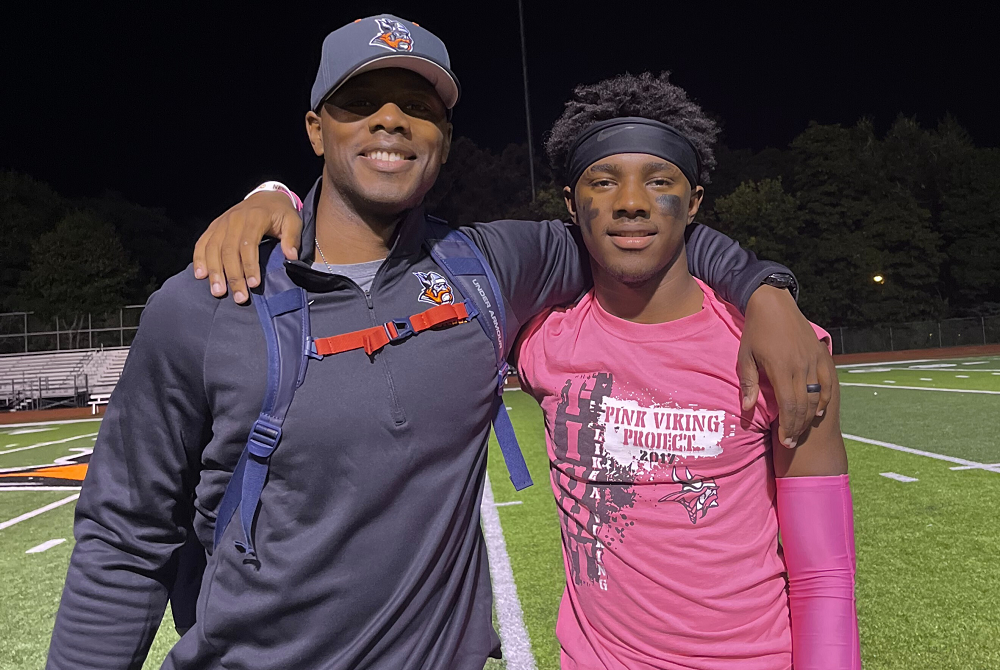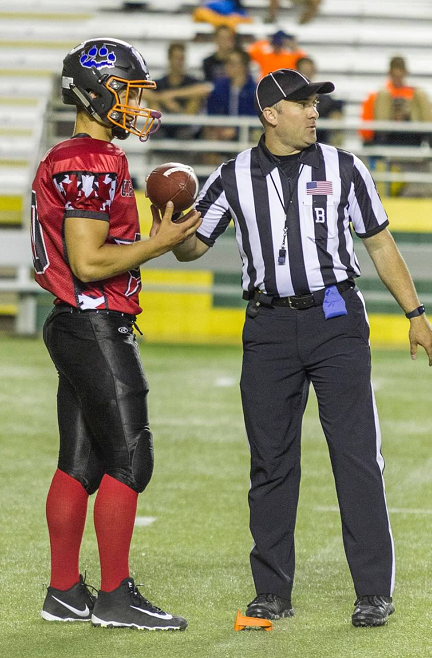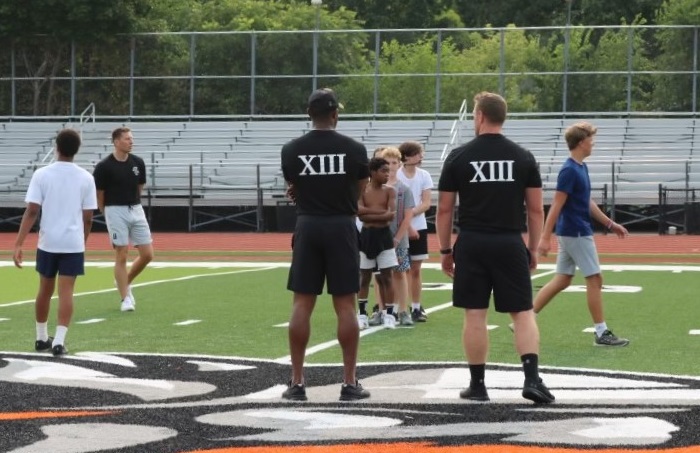
NFHS Voice: Punish Bad Fan Behavior
October 2, 2019
By Karissa Niehoff
NFHS Executive Director
About four weeks ago, we distributed an op-ed suggesting that inappropriate behavior by parents and other adult fans at high school sporting events was causing many officials to quit before they even reached two years on the job.
Although we received mostly positive support from this article, some people thought we went too far in telling parents to “act your age” and “stay in your own lane.” On the contrary, perhaps we should have been more direct.
Last week, one of our member state associations shared a resignation letter it had received from a 20-year veteran soccer official who had taken all the abuse he could handle. A portion of that letter follows:
“Soccer parents: you are absolutely 100% the reason we have a critical refereeing shortage and games are being cancelled left and right. And you are at least a part of the reason I’m done here. The most entitled among you are the ones that scream the loudest. And every time you do this, you tell your son or daughter the following:
‘I do not believe in you, I do not believe in your team, I do not believe in your collective ability to overcome your own adversity and you absolutely will not win and cannot do this without me tilting the table in your favor.’
“On behalf of myself and so many other referees – and I say this with every ounce of my heart and soul – shut up about the referees, and let your kids rise or fall as a team, as a FAMILY. Because the vast majority of you truly have no idea what you’re talking about, and even if you have a legitimate gripe about one play or one decision, you’re not fixing anything.”
And if that wasn’t enough, last week the Eastern Panhandle Youth Football League in West Virginia released the following statement:
“Unfortunately, it has come to the point that because of the abuse, negativity and utter disrespect shown to our officials from parents, coaches and most recently from our players, the Eastern Panhandle Officials Association president stated today that the association will no longer schedule officials for our league games at any field. This means effective immediately all remaining games are cancelled.”
This statement is from a youth league, which means the coaches are likely also parents of players, and the players are sons and daughters who are emulating their parents’ behavior.
So, no, our previous message was not too direct or emphatic. The kind of boorish parental behavior that compels a 20-year soccer official to quit cannot be allowed to continue. While we would hope that parents and other fans would embrace the concepts of education-based athletics by respecting the efforts of those men and women who officiate high school sports, that unfortunately is not occurring in some cases.
As a result, schools must adopt and enforce a strict, fan behavior policy. In soccer, a player receives a “yellow card” as a first warning for unsportsmanlike conduct. If the action occurs again, the player is hit with a “red card” and is ejected from the contest. Some schools have implemented a similar penalty structure for parents and other fans – not just at soccer games but all high school events. If the inappropriate behavior and verbal abuse of officials continues after one warning, the person is removed from the venue. There must be consequences for these offenders before we lose any more officials.
Most of the 7.9 million participants in high school sports are on the fields and courts every day to have fun and compete as a team with their classmates, and the 300,000-plus officials assist in that process. Now, if parents would let the players play and the officials officiate!
Dr. Karissa L. Niehoff is in her second year as executive director of the National Federation of State High School Associations (NFHS) in Indianapolis, Indiana. She is the first female to head the national leadership organization for high school athletics and performing arts activities and the sixth full-time executive director of the NFHS, which celebrated its 100th year of service during the 2018-19 school year. She previously was executive director of the Connecticut Association of Schools-Connecticut Interscholastic Athletic Conference for seven years.

From MSP Post to Postgame: Lieutenants Return to the (Football) Field
September 27, 2023
While fans are settling into another season, Michigan State Police Lt. Tedric Gibbs has been fully immersed in football for months.
The Jackson Post’s assistant post commander serves as assistant coach for Jackson High School’s varsity football team and for the team at Parkside Middle School.
“I started coaching when my older son was in youth sports, as a way to do something together that we both love,” Gibbs said. “My younger son followed the same path, so I joined his team too. I grew up in Jackson and am grateful to be able to serve my hometown from the sidelines and at our post.”
 Some 400 miles north, Lt. Mark Giannunzio is also a familiar face in and on the field. The MSP Negaunee Post assistant post commander and Eighth District public information officer enforces the rules of the game as a high school and college football official, the latter for the Great Lakes Intercollegiate Athletic Conference.
Some 400 miles north, Lt. Mark Giannunzio is also a familiar face in and on the field. The MSP Negaunee Post assistant post commander and Eighth District public information officer enforces the rules of the game as a high school and college football official, the latter for the Great Lakes Intercollegiate Athletic Conference.
“I started at the high school level to stay involved in athletics and make authentic connections in the community,” Giannunzio said. “It’s rewarding to help teach the game and share knowledge of the rules. I currently have a full 11-game schedule in the GLIAC Division II college conference, with high school games interspersed during the year.”
The correlation among coaching, officiating and policing translates.
“With my fellow troopers, I want to inspire, motivate and encourage to get the most out of them,” Gibbs said. “I take the same approach with my players to figure out what they need from me, as their designated leader, to be as successful as they can. In both capacities, I do the work alongside them. We do it together.”
This approach is especially important when tough times surface. Lieutenant Gibbs’ high school team experienced tragedy right before its first game when a player died in a car crash.
“We focused on adversity,” said Gibbs, who was in a unique position to talk from a police perspective too. “It’s a benefit to have that insight and background and share it with what they can control – make good decisions and wear your seatbelt.”
Lieutenant Gibbs incorporates his coworkers when he can, like during spring conditioning when fellow troopers join him and his players, helping all involved to make new connections and build strong bonds between the students and officers.
 “One of the most important attributes in both careers is communication,” Giannunzio said. “Communication can make or break an official and a police officer. Much like selling a citation to a motorist, I need to be able to sell the penalty in a calm and professional manner. Demeanor and attitude go together on both the football field and when we are out patrolling in the Blue Goose.”
“One of the most important attributes in both careers is communication,” Giannunzio said. “Communication can make or break an official and a police officer. Much like selling a citation to a motorist, I need to be able to sell the penalty in a calm and professional manner. Demeanor and attitude go together on both the football field and when we are out patrolling in the Blue Goose.”
Treating everyone with dignity and respect is something Lieutenants Gibbs and Giannunzio commit to as members of a modern police agency and in their areas of expertise on the football field.
“Both roles afford so many opportunities to develop culture and cultivate teamwork,” Gibbs said. “The best part is watching others flourish and playing a part in their growth.”
PHOTOS (Top) Michigan State Police Lt. Tedric Gibbs, left, serves as an assistant football coach for the Jackson High varsity. (Middle) Lt. Mark Giannunzio officiates at the high school and college levels. (Below) Gibbs also coaches at Jackson Parkside Middle School. (Photos provided by the Michigan State Police.)

